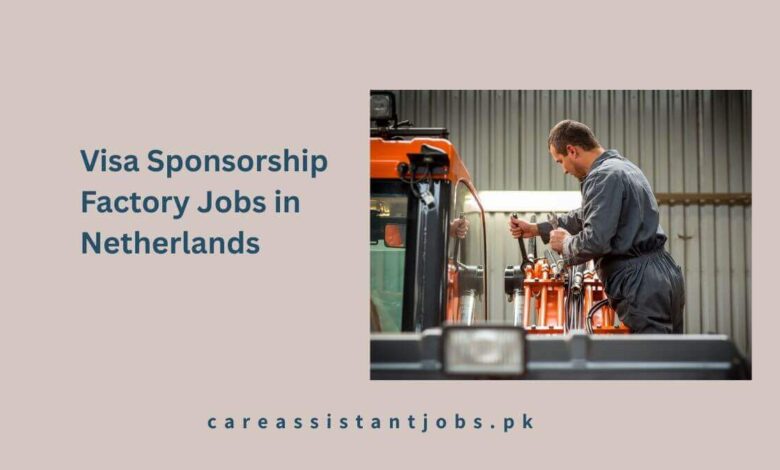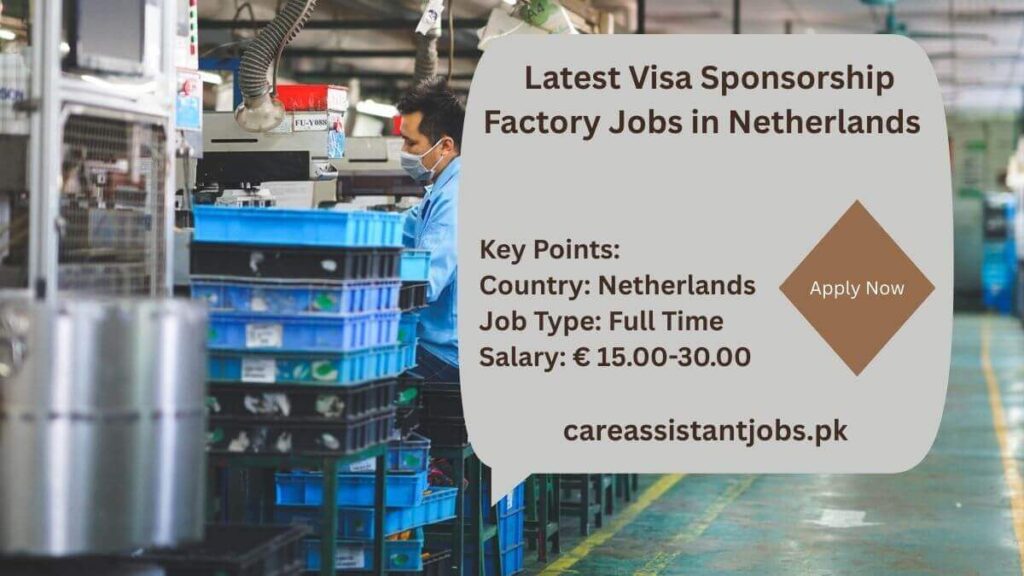Visa Sponsorship Factory Jobs in Netherlands 2025

A valuable opportunity for international job seekers seeking employment in Europe’s dynamic industrial sector is presented by factory positions in the Netherlands with visa sponsorship. This position is accessible to both entry-level and professional workers, as it offers a variety of roles, a structured visa process, and competitive salaries.
Check Also: Housekeeping Jobs in Netherlands with Visa Sponsorship

Job Details:
| Country | Netherland |
| Job | Factory Jobs |
| Education | High School Diploma |
| Experience | 2-3 Years |
| Age | 19-45 |
| Who can Apply? | All Nationalities |
| Salary | €32,173 a year |
| Visa Sponsorship | Yes |
Requirements:
- Capable of engaging in physical labor and employing instruments as required
- Employment Offer: It is mandatory for a Dutch employer to extend an offer of employment that includes the cost of your visa. The provisions of this offer encompass all aspects of the position, including your compensation, benefits, and responsibilities.
- Work Permit or Visa: The necessity of a work permit or visa to begin employment in the Netherlands may differ based on the individual’s nationality and intended duration of stay. Any necessary documentation, such as a work visa or residency permit, will be managed by your manager.
- Skills and Encounter: Although particular organizations may have distinctive formal instruction prerequisites, distribution center staff with imperative abilities and aptitudes are often in high demand. This may require past ability in development work, information on stock administration frameworks, and expertise with apparatus or tools.
- Language Proficiency: The position’s nature and the boss’s requirements may necessitate proficiency in Dutch and/or English. Basic competencies encompass effective collaboration with both superiors and peers, comprehension of mandates, adherence to security conventions, and verbal communication.
- Health Protections: The Netherlands consistently mandates that foreign laborers comply with health protection regulations. To encourage access to therapeutic care during your stay, your boss might offer health protections or assist you in acquiring them.
- Financial Means: Although it isn’t typically required, you will be required to prove that you have adequate funds to support yourself for the first few months of your stay within the Netherlands when applying for a visa.
Responsibilities:
A worker’s obligations and duties on the production line regularly incorporate the following:
- at a generation location
- Inspecting and monitoring apparatus
- Maintaining compliance with security and well-being protocols at all times
- Assembling components or objects
- Preparing objects or components for shipment or advance processing
- Operating platform jacks and forklifts as necessary
- Sorting and evaluating products to ensure quality
- Eliminating defective products and rejects
Benefits:
- Employment Openings:
The Dutch economy is vigorous and diverse, advertising a diverse cluster of incompetent business openings in various segments, including agribusiness, neighborliness, retail, coordination, and fabricating. These differences empower people who need formal instruction or specialized gifts to secure employment. - Competitive Compensation:
In comparison to various other countries, the Netherlands generally raises the minimum wage. Competitive compensation is accessible for humble positions, which can provide an adequate standard of living. - Worker Securities:
The Netherlands has strong labor laws that defend the rights of its laborers. Controls regarding working hours, relaxation periods, and end conditions ensure reasonable treatment within the working environment. - Social Security Benefits:
The Netherlands offers a variety of social security benefits to its workforce, including those in humble positions. These include well-being protections, unemployment benefits, and annuity schemes, which provide monetary security and support individuals during periods of illness, unemployment, or retirement. - Work-Life Adjustment:
The Dutch work culture prioritizes maintaining a solid work-life balance. Managers are generally in favor of part-time work and adaptable working hours, which empower workers to viably oversee their individual and proficient lives.
Salary:
Within the Netherlands, the average annual salary for a Plant Laborer is €32,173 and the hourly rate is €15. The anticipated compensation for a production line laborer is €24,419 to €37,449. The most significant level of education for a factory worker is typically a high school diploma.
How to Apply for Visa Sponsorship Factory Jobs in Netherlands 2025?
- Managers from the Netherlands use online job platforms to advertise employment opportunities, including sponsorship-eligible positions. We will use these worksheets to find positions that match your qualifications and experience, allowing you to tailor your application to the manager. In the Netherlands, LinkedIn, Without a Doubt, and Workopolis are among the most prominent job forums.
- In the Netherlands, there are numerous business departments that specialize in the situation of remote laborers in visa-sponsoring positions. These offices will assist you in identifying business opportunities that align with your qualifications and experience if you surrender your ongoing work inclinations.
- You may apply for high-paying menial employment with visa sponsorship in the Netherlands as a remote national by selecting the “Apply Now” interface shown below.
- A selection of vacant positions will be presented to you on the landing page. In order to arrange application prerequisites and strategies, you will need to reach the initial position at a later time.
Frequently Asked Questions:
What is the term for a factory worker?
A laborer (or labourer) is a person who works in manual labor typed within the construction industry. A generic factory laborer is defined separately as a factory worker. Laborers are in a working class of wage-earners in which their only possession of significant material value is their labor.
How many hours do you work in a factory?
Factory managers typically pressure employees to work 10 to 12-hour days, and sometimes 16 to 18-hour workdays, with hours increasing as order deadlines approach. Despite government regulations, a seven-day workweek is very common during peak periods.
Is it hard to work in a factory?
Overall, working in a factory can be rewarding for those who enjoy hands-on work and are comfortable in a structured environment. However, it can also be challenging due to the physical demands, safety risks, and potential for monotonous tasks



